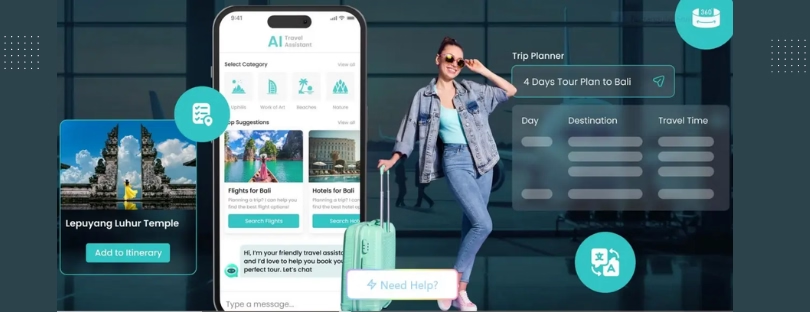
Generative AI Takes Center Stage in Travel Industry, Amadeus Report Highlights
The travel industry is at the forefront of a technological revolution, thanks to generative artificial intelligence (GAI). In a new report, Navigating the Future, Amadeus reveals how Generative AI is being integrated into travel services worldwide, offering promising advancements for travelers and the industry alike. Generative AI in travel
However, the report also highlights significant challenges that companies need to navigate to maximize the technology’s benefits.
Generative AI: Revolutionizing the Traveler Experience
Generative AI has rapidly emerged as a crucial tool for enhancing the traveler’s journey, from planning to post-trip feedback. Its applications are vast and varied, including the creation of personalized itineraries, digital assistance during bookings, and real-time travel support. Through advanced AI-driven chatbots and virtual assistants, travelers can receive tailored recommendations and solutions, making their experiences more seamless and enjoyable.
One of the most significant impacts lies in personalized travel planning. GAI can process large volumes of data, such as user preferences, travel history, and real-time events, to deliver recommendations that fit individual needs, budgets, and styles. This personalization extends to travel inspiration as well, helping travelers discover new destinations and activities.
Industry-Wide Adoption and Challenges
Amadeus’ report, based on insights from over 300 senior travel technology leaders, shows that the adoption of GAI is not only widespread but also accelerating. Approximately 51% of these industry leaders say GAI already has a strong presence in their market. Regions like Asia-Pacific are particularly enthusiastic, with a higher concentration of leaders prioritizing GAI deployment. However, North America shows a slower pace, potentially due to early adoption hurdles.
Despite its advantages, deploying GAI faces challenges. Common obstacles include talent shortages, data privacy concerns, and significant costs. Many companies lack the necessary infrastructure to handle GAI, and finding employees with the expertise to build and maintain these systems is another major concern.
Prioritizing Ethical and Secure GAI Use
The report stresses that ethical and responsible use of GAI is essential. Data security and privacy are top priorities, as GAI systems require vast amounts of sensitive information to deliver personalized services. Companies are implementing advanced safeguards, such as data encryption and multi-factor authentication, to protect user data.
The report also highlights the need for robust regulatory compliance to ensure GAI deployments are safe and trustworthy. To meet these standards, Amadeus encourages companies to establish secure software development practices and conduct regular security audits.
When asked what, if anything, was slowing the roll-out of the technology, industry leaders said:
- Data security – 35%
- Lack of Generative AI expertise and training – 34%
- Data quality and inadequate technological infrastructure – 33%
- ROI concerns, lack of use cases, or difficulty in estimating value – 30%
- Difficulty in connecting with partners or vendors – 29%
Measuring Success: ROI and Customer Satisfaction
For travel companies, the success of GAI initiatives is often measured by return on investment (ROI) and customer satisfaction. Enhanced efficiency, improved productivity, and streamlined operations are also critical benchmarks. The report points out that successful GAI applications not only improve financial metrics but also contribute to a better user experience, leading to higher customer satisfaction and loyalty.
The Future of Generative AI in Travel
Looking ahead, GAI is set to bring even more transformative changes to the travel industry. Real-time language translation, dynamic pricing models, and AI-driven travel inspiration are areas poised for growth. Amadeus sees collaboration as key to achieving these advancements, with over 87% of surveyed leaders open to partnering with vendors to develop GAI solutions.
Sylvain Roy, Chief Technology Officer, Amadeus, said:
“This is a technology that has the potential to transform every facet of the travel ecosystem, significantly enhancing the passenger experience at every step of the journey.
While the technology will be a key focus for the next year, questions are rightly being asked whether Generative AI will deliver sufficient returns on investment, while talent shortages are also coming under the spotlight.
It is crucial that we use this new technology responsibly, including ensuring data security, privacy, and content reliability. It is time for Generative AI to prove it can live up to the hype.”
As the technology matures, GAI has the potential to redefine travel, making it more intuitive, personalized, and responsive. The ongoing commitment to responsible development and collaboration across the industry will ensure that GAI continues to improve the travel experience for all.
Conclusion
Generative AI has arrived in the travel industry, offering exciting opportunities to elevate the traveler experience through personalized, data-driven solutions. While challenges remain, including infrastructure and security concerns, Amadeus’ report demonstrates that the potential benefits far outweigh the obstacles. As GAI technology evolves, its responsible and innovative application will transform travel, making it more dynamic and traveler-centric than ever.











